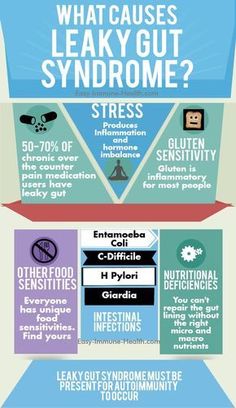Leaky Gut Syndrome, also known as increased intestinal permeability is a  condition that is not typically diagnosed individually, but could affect the health of many people. In this article: what about leaky gut syndrome, light is shed on this condition.
condition that is not typically diagnosed individually, but could affect the health of many people. In this article: what about leaky gut syndrome, light is shed on this condition.
What is Leaky Gut Syndrome
Leaky gut syndrome is a digestive disorder that affects the lining of the small intestines. In this condition, gaps in the intestinal walls allow bacteria and other toxins to pass into the bloodstream.
What is the Cause of Leaky Gut Syndrome
The exact cause of leaky gut is somewhat of a mystery. However, it is well-known that increased intestinal permeability transpires alongside several chronic diseases, including celiac disease and type 1 diabetes.
The problem with this condition is it causes the pores in the small intestine  to widen. When this occurs, the undigested food particles and toxins that are supposed to be blocked are allowed make their way into the bloodstream. Because these items are not normally allowed in the blood, they trigger the immune system to go into attack mode, which can often initiate allergies.
to widen. When this occurs, the undigested food particles and toxins that are supposed to be blocked are allowed make their way into the bloodstream. Because these items are not normally allowed in the blood, they trigger the immune system to go into attack mode, which can often initiate allergies.
For example, if an individual has leaky gut syndrome and eats a piece of fruit. As it makes its way into the small intestine, bits of the undigested fruit that should remain in the small intestine will slip through the enlarged pores directly into the blood stream. Since these particles are not intended to be in the bloodstream, the immune system identifies them as dangerous invaders.
The problem is the immune system doesn’t just build up antibodies to the food particles; it attacks the healthy cells as well. This is one of the ways food allergies and autoimmune illnesses develop.
There are a few other varied ways leaky gut can develop. Case in point, if an individual is chronically constipated, overtime the toxins in their stool will irritate the lining of the intestines. This irritation leads to inflammation which will in turn cause the pores in the small intestine to expand. If the irritation and inflammation are allowed to continue for an extended period of time it can lead to irritable bowel syndrome, Crohn’s disease, or colitis.
With leaky gut syndrome, damaged cells in the intestines don’t produce the substances (enzymes) needed for proper digestion. As a result, the body cannot absorb essential nutrients, which can lead to hormone imbalances and a weakened immune system.
Zonulin is one of such substances produced in the intestines that regulate the tight junctions in the small intestines. It modulates the permeability of tight junctions between cells of the wall of the digestive tract.
Another common cause of leaky gut is an imbalance of the flora inside the gut. We all have good and bad bacteria in our digestive systems. When our gut flora is in balance the bad bacteria pose no threat. But when the bad bacteria outweigh the good quality, irritation and inflammation occur, again, causing the pores of the intestine to open up.
In scores of cases, leaky gut is caused by the diet. Certain foods that we consume every day, including gluten, soy and dairy, can be treated by the body as foreign invaders that had to be fought off. When these foods are consumed, the body goes to war, producing antibodies, which can trigger an immune response that includes diarrhea, headaches, fatigue and joint pain.
Leaky gut can additionally be commenced by medications including antibiotics, steroids or over-the-counter pain relievers like aspirin and acetaminophen, which can inflame the intestinal lining and damage protective mucus layers. This irritation can begin or continue the inflammation cycle that leads to intestinal permeability.
What are the Symptoms of Leaky Gut Syndrome
The following symptoms could be signs of leaky gut:
- Excessive fatigue

- Nutritional deficiencies
- Chronic diarrhea, constipation, gas or bloating
- Headaches, brain fog, memory loss
- Depression, anxiety, ADD, ADHD
- Poor immune system
- Skin rashes and problems such as acne, eczema or rosacea
- Cravings for sugar or carbs
- Arthritis or joint pain
- Autoimmune diseases such as rheumatoid arthritis, lupus, celiac disease or Crohn’s
How is Leaky Gut Syndrome Diagnosed
The standard test for leaky gut syndrome is called the mannitol and lactulose test. Both of these are water-soluble molecules that the body can’t use. Mannitol is easily absorbed by individuals with healthy intestinal linings. Lactulose on the other hand is a larger molecule and is only slightly absorbed. A patient drinks a solution containing both mannitol and lactulose. Urine is collected for six hours and the amount of these molecules present in the urine reflects how much was absorbed by the body. A healthy test shows high levels of the mannitol molecule and low levels of lactulose molecule. If high levels of both molecules are found, it points to a leaky gut event. If low levels of both molecules are found, it indicates general malabsorption of all nutrients.
How to Treat Leaky Gut Syndrome
One thing you can do to heal a leaky gut is to take a supplement. The main one is glutamine. Glutamine, also known as L-glutamine, is a powerful amino acid that has the ability to heal soft tissue like the lining of the small intestines. It is very good for improving the health and integrity of the gut.
Another thing you can do is take a probiotic. Probiotics are filled with good bacteria which can help to revive the balance of your gut flora. You want to possess more good bacteria in your gut. For more information on probiotics read the article: What are the Health Benefits of Probiotics.
Leaky gut is by and large recognized as a symptom, but not a condition, by conventional medicine. The majority of clinical studies have focused on association as opposed to cause and effect, which makes it difficult to establish the amount of time needed to heal leaky gut.
The healing time will be based on the core condition, such as IBS or IBD, and the time it takes an individual and their doctor to get that condition under control.
How to Treat Leaky Gut Syndrome Naturally
Dairy is not recommended, but for an individual who enjoys eating yogurt, Kefir is worth a try, which is full of probiotics.
Kefir is a cultured, fermented beverage that tastes a good deal like a yogurt  drink. It’s made using “starter” grains, just as sourdough bread has a “starter.” This starter is a combination of yeasts, milk proteins, and bacteria. It has a tart, creamy flavor, and it’s loaded with probiotic health benefits.
drink. It’s made using “starter” grains, just as sourdough bread has a “starter.” This starter is a combination of yeasts, milk proteins, and bacteria. It has a tart, creamy flavor, and it’s loaded with probiotic health benefits.
Kefir is most commonly made with dairy milk, but it can be made with non-dairy alternatives including:
- coconut milk
- goat’s milk
- rice milk
- coconut water
Because kefir is fermented, most people who are lactose intolerant can actually drink kefir.
Kefir is now widely available in most places. It is found in some form in most grocery stores near the dairy or yogurt. It’s often used to improve digestion.
Part of the rationale for kefir becoming more available and prevalent within the past few years is perhaps thanks to its health benefits. Kefir is nutrient-dense, with lots of protein, B vitamins, potassium, and calcium. Calcium helps to produce strong bones, protein builds strong muscles, and potassium is crucial for heart health.
Additionally, fermented foods like sauerkraut are good choices, which help balance the gut flora out. It is obvious that one of the main causes of leaky gut is inflammation. OMEGA-3 is known for its capability to combat inflammation. You can increase the quantity of omega-3 in your diet by eating more fatty fish like salmon, or by taking a fish oil supplement.
For a reasonable and reliable on-line source for the supplements mentioned in this article click here.
Preventing Leaky Gut Syndrome
Taking self-care steps that promote overall digestive health could also be the simplest avenue to protect yourself from leaky gut.
- Increase the ingestion of high-fiber foods. The soluble fiber found in vegetables, legumes, and fruit support your gut’s beneficial bacteria, according to a 2016 study.
- Reduce the ingestion of refined carbohydrates. Too much sugar can negatively impact gut barrier function, consistent with a 2014 study Trusted Source.
- Reduce the use of NSAIDs. Nonsteroidal anti-inflammatory drugs (NSAIDs), such as aspirin, ibuprofen, and naproxen, can increase intestinal permeability, according to a 2009 study Trusted Source.
- Take probiotic supplements. The favorable bacteria of probiotics are deemed as helpful for many gastrointestinal conditions, such as IBS, according to a 2009 study.
- Reduce the stress levels. Gut bacteria can be harmed by persistent stress, according to a 2017 study Trusted Source.
- Reduce the alcohol intake. Excessive alcohol intake may increase intestinal permeability, according to a 2014 study Trusted Source.
- Stop smoking. Tobacco smoke may increase gastrointestinal tract inflammation and may be a risk factor for a variety of bowel conditions, consistent with a 2013 study Trusted Source.
If after trying the above suggestions the condition persists, it is recommended that a physician, be consulted, preferably a gastroenterologist.
Please leave any question, comments or concerns below in the comment section.
Good Health!!
I always thought that leaky gut syndrome was the same things as IBS and Chron’s. I didn’t know that it’s the step before that. What’s interesting with these diseases is that they are becoming more and more common. It’s as if our generation is doing something wrong with our food. Thanks for a great post, it’s a boost to keep eating mindfully!
Hi Hollie – leaky gut syndrome is often a result of IBS and Crons but it can occur independently.Medical science is always evolving so it may be more commonly diagnosed. Also, a lot of us have lousy diets these days. Thanks for commenting.
Probiotic is great. I never knew about this leaky gut syndrome.However I have learned that Probiotic, fiber and fermented food are good for our intestines. Leeky gut is not something I would like to have so I will definitely try to follow your advice here. I learned a lot from this article. What types of food contains most probiotic?
Hi Hilde – The types of food that contain the most probiotics are the fermented foods. The most common fermented foods that naturally contain probiotics, or have probiotics added to them, include yogurt, kefir, kombucha, sauerkraut, pickles, miso, tempeh, kimchi, natto, pickles, sourdough bread and some cheeses. Also buttermilk.
Any further questions, don’t hesitate.
Thanks for commenting!
I had never heard of leaky gut syndrome until this article but it sure is interesting. My girlfriend has type 1 diabetes, so I need to tell her about this and see if she’s ever experienced any of the syndromes. Do you know if this is a condition that is often diagnosed?
Hi Hayden – It’s not often diagnosed independently but as a result of another condition such as IBS or Chrons disease. But it can occur independently. If your girlfriend has the symptoms she should get it checked out. Thanks for commenting.
I have heard of this condition but didn’t know exactly what it was until now. Thanks for a detailed explanation of what it is, how it comes about and how to deal with it. I recently bought some of that kefir and the jar still has not been opened. I guess I will open it after reading this. From your discussion and others I have read it seems to me that probiotics should really be a part of my diet and I should not wait around for some adverse conditions to develop before I include it. Thank you for my lesson of the day.
You are welcome JJ – No, please don’t wait for something serious to happen. Prevention is better than cure so it’s best to be proactive with our health instead of reactive. Thanks for commenting and enjoy your kefir!
I have heard about Leaky Gut Syndrome, but, up until you post never really understood what it was all about. In the past, I have been diagnosed with spastic colon and I have always wondered if that was a misdiagnosis. From what I have read from your very helpful post, I wonder if I have a form of Leaky Gut. In any case, I feel that your recommendations to treat the syndrome naturally is the way to go. I really wish that I had access to the information in this post years ago. Have you found any difficulty in convincing Primary Physicians to test for Leaky Gut Syndrome?
Hi Steve – fortunately, I haven’t had the symptoms so there hasn’t been a need to consult with my primary physician about it. But if you feel you want to be tested for it, insist on it. It’s your body and you’re the boss!
Thanks for commenting.